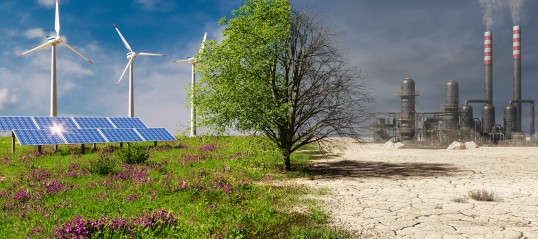- Artificial Intelligence (AI)
- Occupational exposure limit values
- Climate Change and Occupational Safety
- List of CMR substances
- Electromagnetic fields
- Ergonomics
- Industrial Security
- Collaborative robots
- Noise
- Nanoparticles at the workplace
- Optical Radiation
- REACH
- Reference materials
- Proficiency testing
- Vibration
- Virtual reality
- Work 4.0
Decarbonization

Source: Simon Lehmann - PhotoGranary
Background
Worldwide decarbonization (the transition to a low-carbon economy) required to limit climate change has an impact on working environments and thus also on many people’s safety and health. The focus currently lies on the transition in the spheres of energy, heating and transport, and on transformation of industry to greenhouse gas neutrality. Expansion of renewable energies makes a crucial contribution to decarbonization in these sectors. Further key elements of decarbonization are:
- Reducing consumption, for example directly or by the switch to alternatives with lower emissions (energy efficiency, resource efficiency, circular economy)
- Protection and restoration of natural carbon sinks (e.g. reforestation, peatland rewetting)
- Capture (and storage) of greenhouse gases. In the medium to long term, technologies for capturing greenhouse gases could also become more relevant in Germany
Overall, the transition to the low-carbon economy is dynamic and driven by innovation. Purposeful cooperation between research institutions and industry can help to establish safety and health at work even as new technologies and industries are emerging.
Expansion of renewable energies and the resulting impact on safety and health at work
Germany aims to almost double the proportion of its gross electricity consumption met by renewable energies, from just over 46% in 2022 to 80% by 2030. For this purpose, wind and solar energy must be expanded at triple the current rate; wind turbine and photovoltaic systems that are now 20 to 25 years old must be replaced, and electricity grids must be upgraded and expanded.
By 2045, buildings in Germany should be climate-neutral. This is to be attained by use of renewable energies on the widest possible scale (e.g. solar thermal energy, geothermal energy and heat pumps) and by greater use of district heating and green hydrogen. Renovation of buildings and reduced consumption should also assist in attaining the desired reduction in greenhouse gas emissions.
In order to drive decarbonization forward in the transport sector, the German government is attaching importance to alternative drivetrain technologies, in particular by increasing electromobility. The German government has committed to the goal of 15 million all-electric cars by 2030. At the end of 2023, only around 1.3 million such vehicles were on the roads. In addition, from 2035 onwards, registration of new vehicles with combustion engines will be prohibited throughout the EU unless they are CO2-neutral. The charging infrastructure necessitated by this transition must also be expanded on a wide scale, and must be user-friendly and satisfy the requirements.
For the manufacturing and construction industries, the amended Climate Change Act provides for a further 30% reduction in greenhouse gas emissions by 2030 from 2021 levels. The measures to achieve this include electrification, the use of green hydrogen and establishment of a circular economy.
Climate change calls for swift and comprehensive expansion of renewable energies. The resulting pressure for implementation and the shortage of skilled workers in the skilled trades, the construction sector, the power generation and distribution industry and many other affected sectors present a potential risk of work intensification, overload and even resignation.
Furthermore, innovations are driving decarbonization forward and can give rise to completely new vocations, activities and tasks for the affected employees. The risks and hazards of these developments must be anticipated, researched and assessed. At the same time, the green transformation results in familiar risks and hazards being displaced to other sectors. Transfer of existing knowledge regarding safe and healthy work between the affected sectors thus becomes all the more important.
Work of the KKA at the IFA
The IFA’s Competence Centre for Climate Change and Occupational Safety and Health provides technical and scientific expertise to the German Social Accident Insurance Institutions and, as far as currently possible, expertise on the shaping of safe and healthy work during the transformation to a CO2-neutral economy.
Contact

Competence Centre for Climate Change and Occupational Safety and Health at the IFA
Email: kka@dguv.de
Contact:
Angelika Hauke
Tel.: +49 30 13001-3633